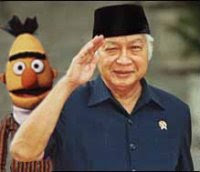First
there was J-pop, then came K-pop, and now I-pop stands poised to win over the
world's teenyboppers. The
attention of the whole world has been focused on Asian pop music of late in the
wake of the "Gangnam Style" ear worm, a Korean pop-cultural
phenomenon that has conquered the entire planet, notching up a record 861
million YouTube hits in the process. Even UN Secretary General Ban Ki-Moon has
described the unprecedented global smash as a, "force for world peace,”
which I think might be gilding the lily just slightly.
PSY's Solar
System conquering hit, which parodies the lavish lifestyles of Seoul's Gangnam
district, will probably prove to be a one-hit wonder, however Asian pop music
itself has a long and illustrious past behind it, and now I-pop (Indonesian
pop) is bidding to join J-pop (Japanese pop) and K-pop (Korean pop) on heavy
radio rotation around the world.
Now, it
should be stressed at the outset that if you're not a teenage female of the
species then you may well rather, like myself, prefer to saw your own legs off
with the sharp edge of a copy of Gadis magazine to actually listening to
most of this stuff, however there is no doubt that the star of Asian pop is rising
at the moment and that the music represents a social phenomenon most definitely
worth remarking on.
J-pop was
the first Asian popular music to be truly in and of itself, and entered the
musical mainstream during the 1990s, although its history dates back to the
1970s and Japanese synth-pop bands such as Yellow Magic Orchestra and Southern
All Stars. Currently, one of the biggest (in every sense of the word) J-pop
groups is AKB 48, who are one of the highest earning musical acts in the world
with record sales in 2011 reaching a whopping US$200 million in Japan alone
(although the group’s share of this had to be split among its Guinness World
Record-breaking 91 members!).
The huge
group is divided into three subgroups, Team A, Team K and Team B and also
includes a number of aspiring members known as kenkyusei (trainees).
It's perhaps not coincidental that this hit-making behemoth of a group appears
to structure itself like some bobby-socks wearing multinational corporation,
and as the band's profits reach for the stratosphere, no doubt the accountants
are rubbing their hands together gleefully.
And so
over to I-pop , Indonesia 's
answer to the super-slick, Samsung and Sony powered smashes of the Far East . I-pop's profile is also on the rise at the
moment and even Indonesia Indonesia 's Tourism
Ministry recently sent a party of pop musicians over to South Korea
Wishful
thinking? Perhaps, however it has to be said that Indonesia's music industry
now dominates its own domestic market at least, despite being blighted by
copyright piracy, and in 2010, Indonesia's creative economy contributed some
Rp. 468 trillion (US$ 48.6 billion) to the economy, growing by 6 per cent in
the process and absorbing some 7.9 per cent of the country's workforce.
I-pop (or
Indo pop) acts range from long-time stalwarts such as Peterpan (now Noah),
Sheila on 7 and d'Masiv, to new teeny-bop sensations such as Cherry Belle and
Princess (both girl bands) and ZooM and HITZ (boy bands, if you can tell the
difference). And, naturally, social media such as Facebook feature plenty of I-pop
(as well as anti-I-pop!) groups.
J-pop and
K-pop influences abound in the protean world of I-pop, it has to be said. Local
bands such as J Rocks, Geisha, and Daisha, as their names suggest, remain in a thrall
to their more illustrious, hair-gel abusing peers across the oceans of the
Orient, and Indonesia even has its own answer to AKB 48: JKT 48.
This
sister group was formed just over a year ago and, according to producer Yasushi
Akimoto, can become, "A bridge between Indonesia
and Japan
I-pop is
not completely derivative of its more established Japanese and Korean cousins
however, and local flavours, sentiments and styles are increasingly featuring
in the music as it develops its own national identity. I-pop is also extending
its reach beyond Indonesia 's
borders to Malaysia , Singapore and Brunei Malaysia
As in
demand as I-pop has become in Malaysia however, there is as yet little sign of
the obsessive, compulsive behaviour of a certain section of K-pop fans being
replicated over here. Specifically we’re here talking about fans who engage in
stalking and invasions of artists’ privacy, and indeed there are even taxi
services in Korea


